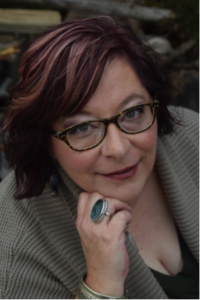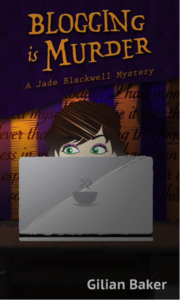Guest Post: The “Magical Formula” for Writing Fiction
Today on the blog is Gilian Baker, author of Blogging is Murder, and she discusses academic writing versus fiction writing in her guest post. I look forward to reading her debut novel, just released Feb. 19.
About Gilian Bak er
er
Gilian Baker is a former writing and literature professor who finally threw in the towel and decided to just show ‘em how it’s done. She has gone on to forge a life outside of academia by adding blogger & ghostwriter to her CV. She currently uses her geeky superpowers only for good to entertain cozy mystery readers the world over. When she’s not plotting murder, you can find her puttering in her vegetable garden, knitting in front of the fire, snuggled up with her husband watching British mysteries or discussing literary theory with her daughter.
In her next life, she fervently hopes to come back as a cat, though she understands that would be going down the karmic ladder. She lives in Flagstaff, Arizona with her family and their three pampered felines.
Contact Gilian Baker directly at mailto:Gilianbakerauthor@gmail.com
BLOGGING IS MURDER on Goodreads
The “Magical Formula” for Writing Fiction
I began writing Blogging is Murder for fun—to have a creative outlet. I wrote most of the day, every day, but I’d never written fiction. I didn’t worry that I didn’t knowing how to structure a cozy mystery plot or how to flesh out a cozy protagonist that fans would love. I just wrote.
I’d always wanted to write fiction, but questioned whether I had it in me. After all, I’d been trained to write academically—literary analysis and criticism. I knew I was a good writer—I made my living from writing. But could I write fiction?
When I decided to take a chance and finish the story of Blogging is Murder to publish, that’s when I began studying how to write fiction, specifically cozy mysteries. Then, I wrote the story. The biggest surprise of the whole process was that it wasn’t unfamiliar to me at all—it was the same writing process I used for writing academic tomes.
As an English professor, I understood the writing process, of course I did. But I had in my head that the writing process for fiction would be magically different from the one used for non-fiction. I’d never tried to write it before, so how did I know? I’d never even taken a fiction writing course during my years as a student. In fact, I’d stayed far away from such courses, worried I’d fail miserably. It was safer to stay in the realm of analyzing obscure literary texts where I had the use of theory to structure my thesis.
No, there is no thesis as such in fiction. However, the steps in the process were strikingly similar:
- I came up with an idea that I thought might just work
- I researched to verify the idea was indeed plausible
- I wrote a zero draft, just letting it pour out of me. I didn’t worry about repeating myself or getting everything just so. I only wrote.
- When I came up against a concept or plot twist I was unsure about, I journaled until I decided on the direction that felt right or that I could make work.
- I researched again to verify the plausibility of the direction I planned to go.
- I completed steps 3-5 over and over until I got to the end.
- When I had a sudden burst of inspiration, I stopped in my tracks and wrote it down in my always-present notebook.
- I went back into the text and fixed “holes” in my argument or plot.
- I took the zero draft and turned it into a first draft, then a second, etc.
Halfway through the process, it occurred to me that there isn’t any magical writing process for fiction. It’s the same one I’d used for years. What a revelation! Really, it was. And it made me feel more secure in my ability to write something other cozy mystery fans would want to read.
Of course, we all have our own writing process, and I’ve encouraged students for years to find theirs and then use it faithfully. But I would never have guessed that I’d need to remind myself of that.
Now that Blogging is Murder is available to readers, I’ve started working on the second book in the Jade Blackwell Mysteries series. And I’m using the same “magical formula” that I’ve had at my disposal all along.
If you want to see how cyber-stalking, hemlock and blogging mingle to create a delightful cozy mystery, get a copy of Blogging is Murder.
 Though she was certainly born with all the traits of a world-class private detective, blogger Jade Blackwell believed she would do nothing more than solve the murders in her latest favorite cozy mystery book.
Though she was certainly born with all the traits of a world-class private detective, blogger Jade Blackwell believed she would do nothing more than solve the murders in her latest favorite cozy mystery book.
Set in mountainous south-eastern Wyoming, Jade Blackwell lives in a log home in the quaint village of Aspen Falls with her husband, Christian and daughter Penelope (Ellie). She left her life as a tenured college English professor at the University of Wyoming four years ago, sick of the bureaucracy, mounds of essays to grade and apathetic students. She turns to blogging and ghostwriting as her new career.
Jade’s promising career as a blogger halts abruptly when she learns of a hacker who is controlling her friend and fellow blogger Liz Collin’s business remotely. When the hacker is found dead in her home, Liz is thrown in jail.
Determined to help her friend regain her life and livelihood, Jade teams up with Liz’s reluctant lawyer, Gabriel Langdon, to get Liz off the hook and out of jail. What she learns will break the case wide open, while unraveling her faith in humanity and the safety she feels living in the Rocky Mountain hamlet she calls home.
An exciting thrill ride from the first page, to the last. Read Gilian Baker’s Blogging is Murder, the first book in the Jade Blackwell cozy mystery series!
[…] February 23 – “Cozy Mystery Writing vs. Academic Writing” https://maryangelabooks.com/2017/02/guest-post-magical-formula-writing-fiction/ […]